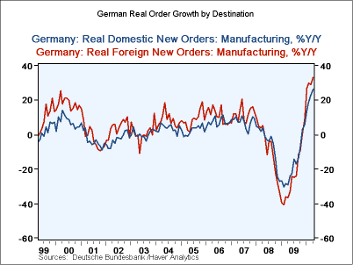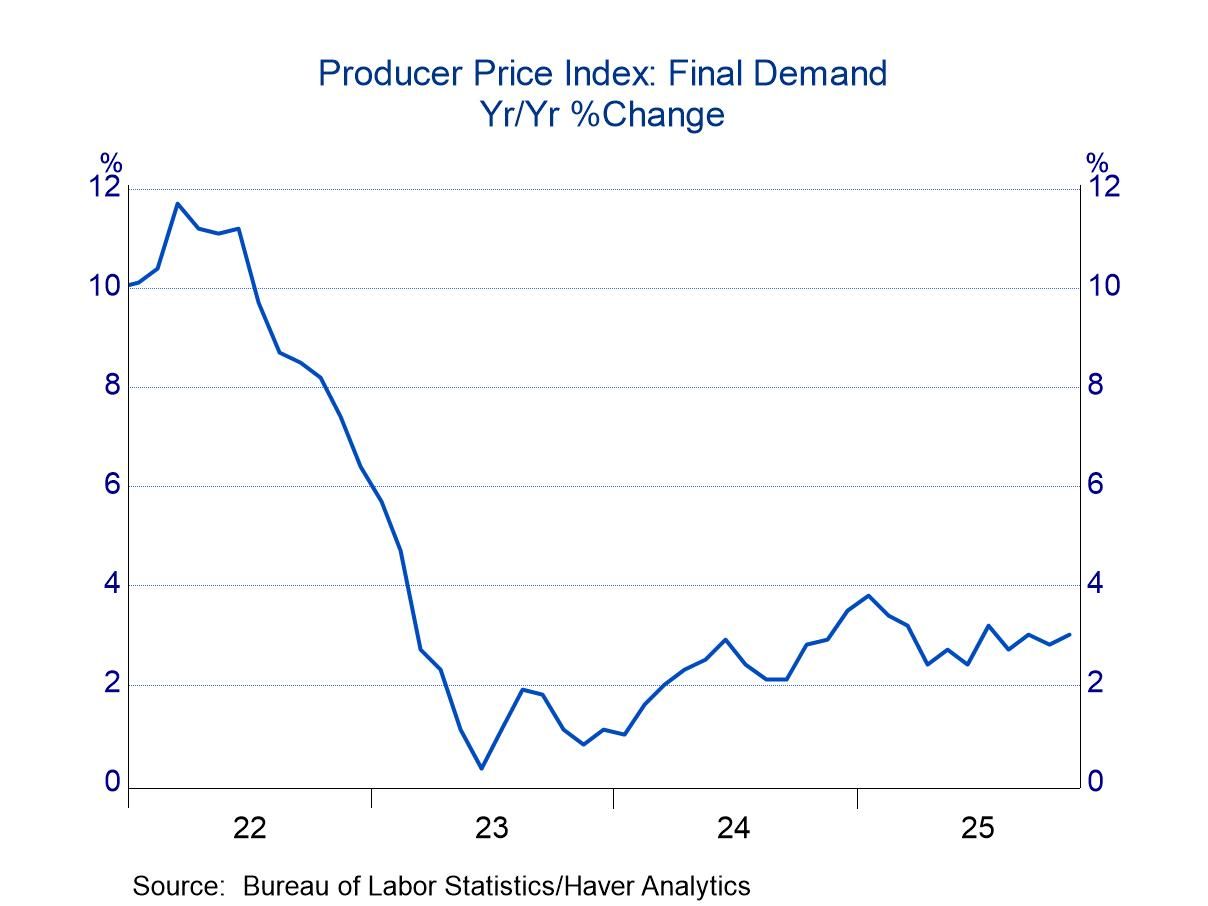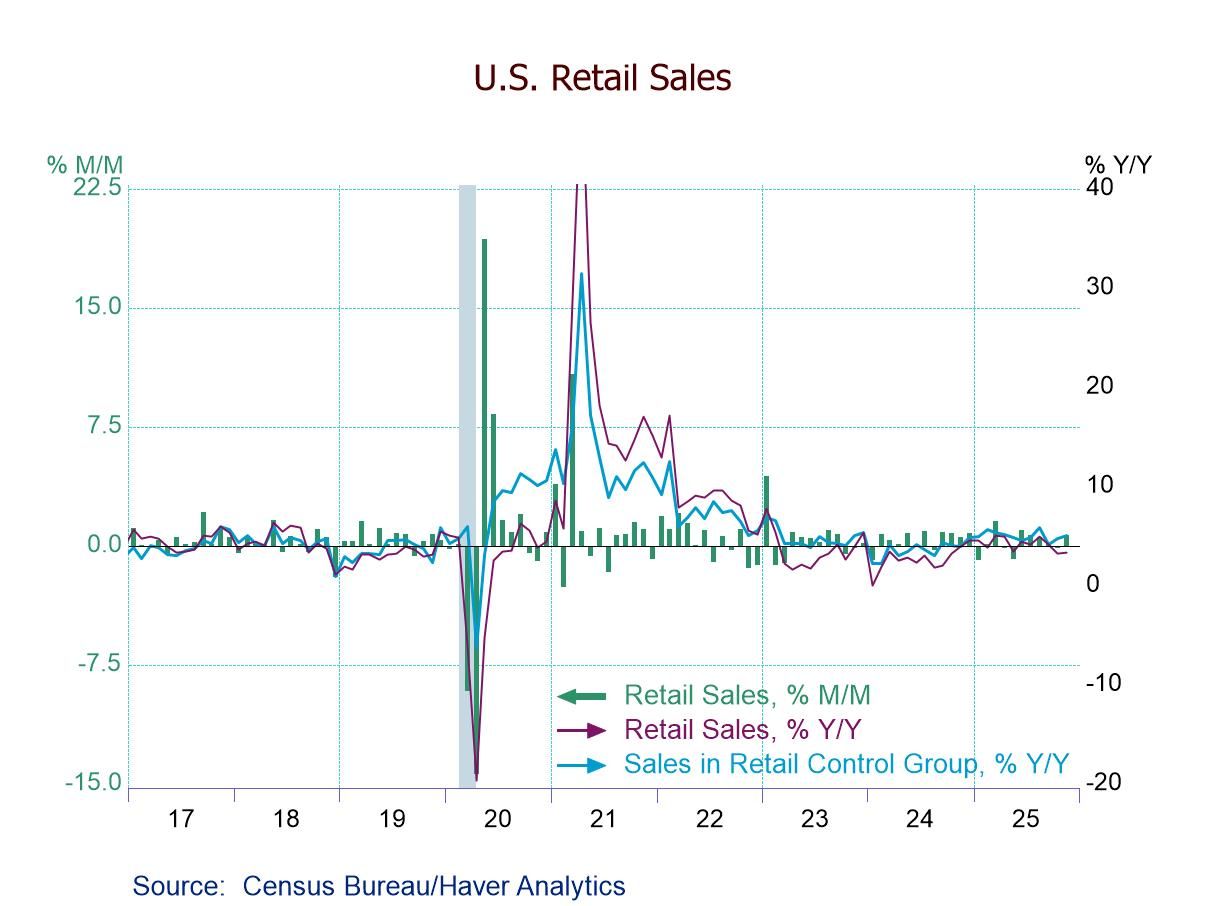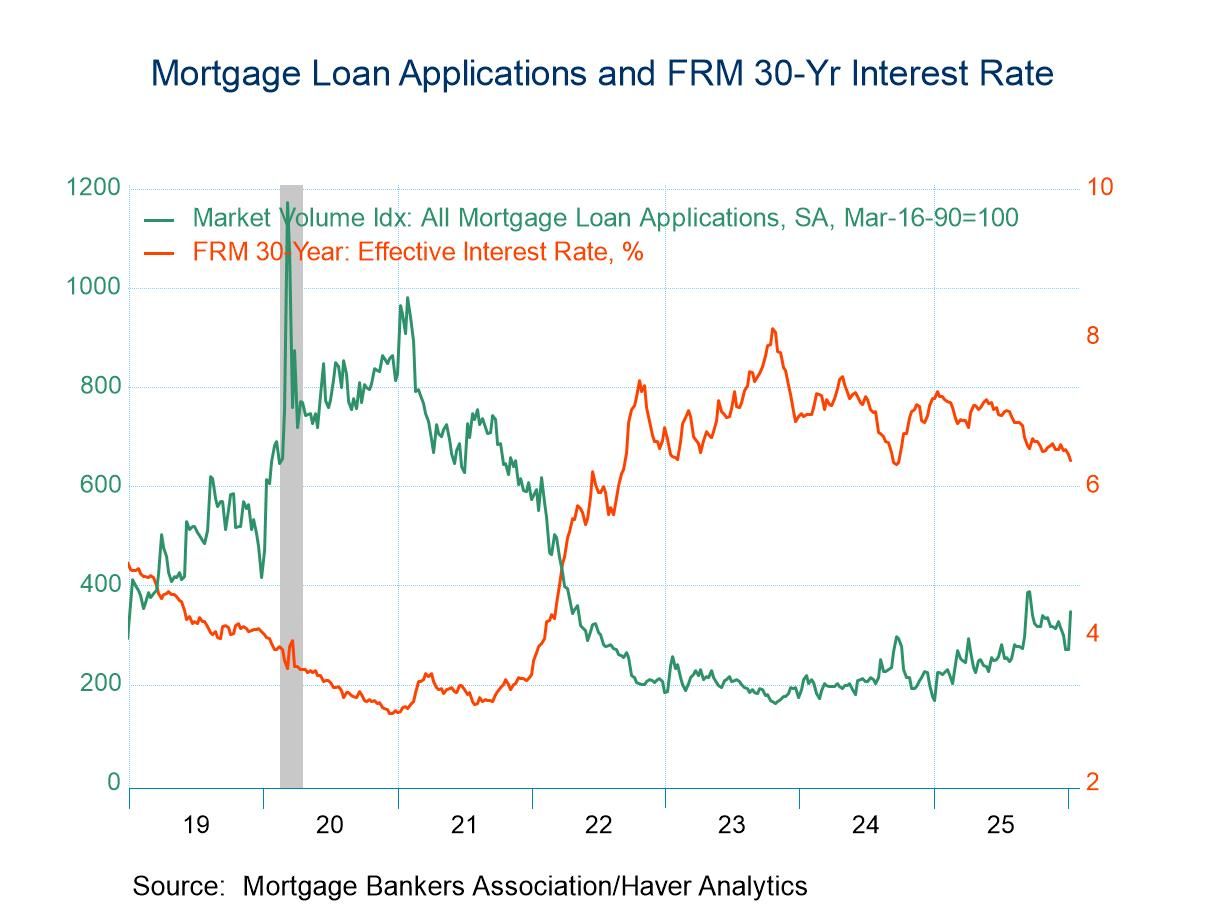 Global| Jun 07 2010
Global| Jun 07 2010German Foreign Orders Surge As Merkel Looks At Budget Cutting
Summary
German orders surged in April rising by 2.8% on the heels of a 5.1% gain in March. As a result the three month growth rate of orders is up to 36.7% (saar). Foreign orders are roaring at a 43.3% annual rate over three months. Domestic [...]
 German orders surged in April rising by 2.8% on the heels of a 5.1%
gain in March. As a result the three month growth rate of orders is up
to 36.7% (saar). Foreign orders are roaring at a 43.3% annual rate over
three months. Domestic orders are up at a nearly 30% annual rate.
Still, overall German orders are down nearly 17% from their cyclical
peak with foreign orders down by 20% and domestic orders off by13%. In
the midst of all the cheering, it's good remember where we stand.
German orders surged in April rising by 2.8% on the heels of a 5.1%
gain in March. As a result the three month growth rate of orders is up
to 36.7% (saar). Foreign orders are roaring at a 43.3% annual rate over
three months. Domestic orders are up at a nearly 30% annual rate.
Still, overall German orders are down nearly 17% from their cyclical
peak with foreign orders down by 20% and domestic orders off by13%. In
the midst of all the cheering, it's good remember where we stand.
At the G-20 meeting US Treasury Secretary Tim Geithner argued that Europeans surplus counties had to commit to growth. German orders seem to be on the right track for that. But Angela Merkel is looking to restore budget 'balance' already while the rest of the G-20 still seems to be the mode of arguing that it is too soon to take away the special sauce of cyclical stimulus. But German is nonetheless pursing a policy that says, hold the pickles, hold the lettuce. Time will tell if this will upset us.
Certainly Germany points up a dilemma in global policy coordination.
As Europe's largest economy Germany needs to set an example and make the right contribution. Merkel seems to think that means restoring fiscal order as soon as possible. But, arguably, one of the main things that caused this mess - the original financial crisis -- was the gaping wide US balance of payments deficits. They caused money to pour into the US and seek out investments that foreign investors had no special insight for. So now the US is going to grow strongly but other countries are going to slam on the brakes and the US current account deficit is going to balloon again. So why is that good? If Germany won't be part of the solution, it will become part of the problem. Its policy approach is very ethnocentric and shows why the euro will never be able to serve a role as a reserve unit to rival the dollar. Policy in Europe has no international dimension.
Germany has a very high export-to-GDP ratio. It is exploiting the global economy and its growth for its worth. Germany is not contributing much in the way of demand to the world economy although it is a relatively rich nation. And now with the euro having crashed and burned German competitiveness has been fully augmented, putting it in a position to be able to depend on better growth. So Merkel feels less constrained about tackling her budget deficit that ahs been exacerbated by Germany's pledge to assist Greece. So is Merkel being virtuous or villainous?
In this recovery period Germany has been consistently posting surprisingly strong economic figures. That stopped a month or so ago when some of the leading indicators of confidence and expectations began to waffle in the wake of the European troubles. Up until that time German growth estimates had been marked higher. Now is a curious time for economists as the German orders are surprisingly strong and the weak euro is surly going to boost growth but at a time when there is worry about backsliding in the rest of Europe because of the fiscal austerity planes being adopted throughout the region.
All this is curious. It is as though Merkel does not want to be left behind as Portugal, Spain and Greece set their teeth for some austerity. But Germany does not need as much as the other regions. Merkel may be dealing with domestic issues and perceptions as much as anything in her pursuit of fiscal redress. Germany may face enhanced growth prospects because of the weak euro, but its domestic economy is still struggling and its unemployment is high. Yet because of its social safety net those are not political impediments back home. Germans like austerity.
Unlike a lot of other economists I am not so afraid of a Euro-slowdown and it has nothing to do wit the numbers. By the numbers the US fiscal stimulus program should have been a smashing success but it was not because it was crafted for ideological goals by an administration that underestimated the true severity of recession but over sold the risk to get a large spending program it could then misallocate based on its underestimate of need. In Europe we see austerity being developed in countries that don't really have the backbone for it. So while there will be some success I thing austerity is one of the things politicians do the worst. So let's not oversell its impact...except maybe in Germany. Germany is one place where austerity means something. Germany has a hard money culture because of some real economy mistakes of the opposite nature. And just as, no one is more of tyrant about not smoking than a former a smoker, or about not drinking than a former drinker, no one is more cocksure about austerity than a former monetary abuser. So Germanys tilt to tightness is something not to be ignored.
As a result of all this Europe is caught in a vicious policy vortex and in market cross-currents that are some of the worst that it has ever seen. If there were independent currencies in Europe we would be seeing some real fun. But it's not working that way this time. It think it's too soon to mark down growth forecasts in Europe since the recovery has actually been looking stronger in the recent data and since the lower euro value will give Europe a boost. Germany's tilt toward austerity, if it comes, bears watching. But I don't look for the rest of the region to over do it except maybe Greece which is under a special kind of microscope.
We should remain on the watch not just for policy moves but for how economic data behave. The orders from Germany are stunningly strong for a country in region where US economists have begun to cut growth forecasts. Europe is topsy-turvy and Germany is in the center of it all.
| German Orders and Sales By Sector and Origin | ||||||||
|---|---|---|---|---|---|---|---|---|
| Real and SA | % M/M | % Saar | ||||||
| Apr-10 | Mar-10 | Feb-10 | 3-MO | 6-Mo | 12-Mo | YrAgo | QTR-2-Date | |
| Total Orders | 2.8% | 5.1% | 0.0% | 36.7% | 16.9% | 29.8% | -33.2% | 44.3% |
| Foreign | 2.8% | 4.7% | 1.7% | 43.3% | 19.7% | 33.1% | -36.6% | 46.3% |
| Domestic | 2.9% | 5.6% | -1.7% | 29.9% | 14.0% | 26.1% | -29.1% | 42.1% |
| Real Sector Sales | ||||||||
| MFG/Mining | 1.2% | 3.1% | -0.2% | 17.5% | 8.4% | 13.2% | -23.8% | 20.8% |
| Consumer | -1.9% | 4.7% | -2.1% | 2.2% | 1.1% | -1.7% | -7.3% | 2.6% |
| Cons Durables | 1.2% | -0.8% | -2.4% | -7.6% | -3.9% | 7.7% | -24.1% | -0.7% |
| Cons Non-Durable | -2.3% | 5.5% | -2.2% | 3.4% | 1.7% | -3.1% | -4.0% | 3.2% |
| Captial Gds | 0.4% | 2.4% | 0.5% | 14.3% | 6.9% | 16.8% | -31.0% | 14.0% |
| Intermediate Gds | 3.8% | 3.2% | -0.3% | 29.9% | 14.0% | 19.0% | -23.3% | 40.6% |
| All MFG-Sales | 1.2% | 3.1% | -0.2% | 17.4% | 8.4% | 13.3% | -23.7% | 20.8% |
Robert Brusca
AuthorMore in Author Profile »Robert A. Brusca is Chief Economist of Fact and Opinion Economics, a consulting firm he founded in Manhattan. He has been an economist on Wall Street for over 25 years. He has visited central banking and large institutional clients in over 30 countries in his career as an economist. Mr. Brusca was a Divisional Research Chief at the Federal Reserve Bank of NY (Chief of the International Financial markets Division), a Fed Watcher at Irving Trust and Chief Economist at Nikko Securities International. He is widely quoted and appears in various media. Mr. Brusca holds an MA and Ph.D. in economics from Michigan State University and a BA in Economics from the University of Michigan. His research pursues his strong interests in non aligned policy economics as well as international economics. FAO Economics’ research targets investors to assist them in making better investment decisions in stocks, bonds and in a variety of international assets. The company does not manage money and has no conflicts in giving economic advice.






